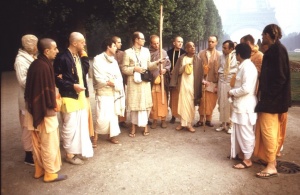CC Madhya 20.328: Difference between revisions
m (1 revision(s)) |
No edit summary |
||
| Line 1: | Line 1: | ||
{{ | [[Category:Sri Caitanya-caritamrta - Madhya-lila Chapter 20|C328]] | ||
<div style="float:left">'''[[Sri Caitanya-caritamrta|Śrī Caitanya-caritāmṛta]] - [[CC Madhya|Madhya-līlā]] - [[CC Madhya 20|Chapter 20: Lord Śrī Caitanya Mahāprabhu Instructs Sanātana Gosvāmī in the Science of the Absolute Truth]]'''</div> | |||
<div style="float:right">[[File:Go-previous.png|link=CC Madhya 20.327|Madhya-līlā 20.327]] '''[[CC Madhya 20.327|Madhya-līlā 20.327]] - [[CC Madhya 20.329|Madhya-līlā 20.329]]''' [[File:Go-next.png|link=CC Madhya 20.329|Madhya-līlā 20.329]]</div> | |||
{{CompareVersions|CC|Madhya 20.328|CC 1975|CC 1996}} | |||
{{RandomImage}} | |||
==== TEXT 328 ==== | ==== TEXT 328 ==== | ||
<div | <div class="verse"> | ||
indra-sāvarṇye ‘bṛhadbhānu’ abhidhāna | :indra-sāvarṇye ‘bṛhadbhānu’ abhidhāna | ||
ei caudda manvantare caudda ‘avatāra’ nāma | :ei caudda manvantare caudda ‘avatāra’ nāma | ||
</div> | </div> | ||
| Line 12: | Line 16: | ||
==== SYNONYMS ==== | ==== SYNONYMS ==== | ||
<div | <div class="synonyms"> | ||
indra- | ''indra-sāvarṇye''—in the Indra-sāvarṇya-manvantara; ''bṛhadbhānu''—the ''avatāra'' named Bṛhadbhānu; ''abhidhāna''—named; ''ei caudda manvantare''—in the fourteen manvantaras; ''caudda''—fourteen; ''avatāra''—of the incarnations; ''nāma''—different names. | ||
</div> | </div> | ||
| Line 19: | Line 23: | ||
==== TRANSLATION ==== | ==== TRANSLATION ==== | ||
<div | <div class="translation"> | ||
“In the Indra-sāvarṇya-manvantara, the avatāra is named Bṛhadbhānu. These are the names of the fourteen avatāras in the fourteen manvantaras. | “In the Indra-sāvarṇya-manvantara, the avatāra is named Bṛhadbhānu. These are the names of the fourteen avatāras in the fourteen manvantaras. | ||
</div> | </div> | ||
| Line 26: | Line 30: | ||
==== PURPORT ==== | ==== PURPORT ==== | ||
<div | <div class="purport"> | ||
Śrīla Bhaktisiddhānta Sarasvatī Ṭhākura, in his Anubhāṣya, gives a list of Manus and their fathers’ names: (1) Svāyambhuva Manu, the son of Lord Brahmā; (2) Svārociṣa, the son of Svarocis, or Agni, the predominating deity of fire; (3) Uttama, the son of King Priyavrata; (4) Tāmasa, the brother of Uttama; (5) Raivata, the twin brother of Tāmasa; (6) Cākṣuṣa, the son of the demigod Cakṣus; (7) Vaivasvata, the son of Vivasvān, the sun-god (whose name is mentioned in the Bhagavad-gītā [4.1]); (8) Sāvarṇi, a son born to the sun-god and his wife Chāyā; (9) Dakṣa-sāvarṇi, the son of the demigod Varuṇa; (10) Brahma-sāvarṇi, the son of Upaśloka; (11-14) Rudra-sāvarṇi, Dharma-sāvarṇi, Deva-sāvarṇi and Indra-sāvarṇi, the sons of Rudra, Ruci, Satyasahā and Bhūti respectively. | Śrīla Bhaktisiddhānta Sarasvatī Ṭhākura, in his ''Anubhāṣya'', gives a list of Manus and their fathers’ names: (1) Svāyambhuva Manu, the son of Lord Brahmā; (2) Svārociṣa, the son of Svarocis, or Agni, the predominating deity of fire; (3) Uttama, the son of King Priyavrata; (4) Tāmasa, the brother of Uttama; (5) Raivata, the twin brother of Tāmasa; (6) Cākṣuṣa, the son of the demigod Cakṣus; (7) Vaivasvata, the son of Vivasvān, the sun-god (whose name is mentioned in the [[Bhagavad-gita As It Is (1972)|''Bhagavad-gītā'']] [4.1]); (8) Sāvarṇi, a son born to the sun-god and his wife Chāyā; (9) Dakṣa-sāvarṇi, the son of the demigod Varuṇa; (10) Brahma-sāvarṇi, the son of Upaśloka; (11-14) Rudra-sāvarṇi, Dharma-sāvarṇi, Deva-sāvarṇi and Indra-sāvarṇi, the sons of Rudra, Ruci, Satyasahā and Bhūti respectively. | ||
</div> | </div> | ||
__NOTOC__ | |||
<div style="float:right; clear:both;">[[File:Go-previous.png|link=CC Madhya 20.327|Madhya-līlā 20.327]] '''[[CC Madhya 20.327|Madhya-līlā 20.327]] - [[CC Madhya 20.329|Madhya-līlā 20.329]]''' [[File:Go-next.png|link=CC Madhya 20.329|Madhya-līlā 20.329]]</div> | |||
__NOTOC__ | |||
__NOEDITSECTION__ | |||
Revision as of 16:04, 7 September 2021

A.C. Bhaktivedanta Swami Prabhupada
TEXT 328
- indra-sāvarṇye ‘bṛhadbhānu’ abhidhāna
- ei caudda manvantare caudda ‘avatāra’ nāma
SYNONYMS
indra-sāvarṇye—in the Indra-sāvarṇya-manvantara; bṛhadbhānu—the avatāra named Bṛhadbhānu; abhidhāna—named; ei caudda manvantare—in the fourteen manvantaras; caudda—fourteen; avatāra—of the incarnations; nāma—different names.
TRANSLATION
“In the Indra-sāvarṇya-manvantara, the avatāra is named Bṛhadbhānu. These are the names of the fourteen avatāras in the fourteen manvantaras.
PURPORT
Śrīla Bhaktisiddhānta Sarasvatī Ṭhākura, in his Anubhāṣya, gives a list of Manus and their fathers’ names: (1) Svāyambhuva Manu, the son of Lord Brahmā; (2) Svārociṣa, the son of Svarocis, or Agni, the predominating deity of fire; (3) Uttama, the son of King Priyavrata; (4) Tāmasa, the brother of Uttama; (5) Raivata, the twin brother of Tāmasa; (6) Cākṣuṣa, the son of the demigod Cakṣus; (7) Vaivasvata, the son of Vivasvān, the sun-god (whose name is mentioned in the Bhagavad-gītā [4.1]); (8) Sāvarṇi, a son born to the sun-god and his wife Chāyā; (9) Dakṣa-sāvarṇi, the son of the demigod Varuṇa; (10) Brahma-sāvarṇi, the son of Upaśloka; (11-14) Rudra-sāvarṇi, Dharma-sāvarṇi, Deva-sāvarṇi and Indra-sāvarṇi, the sons of Rudra, Ruci, Satyasahā and Bhūti respectively.